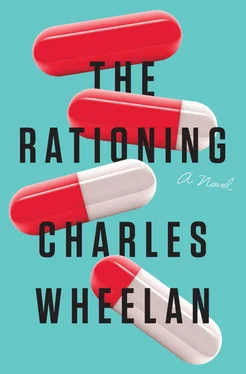Tie Guy’s question was instructive to me. He was a hardheaded analyst if there ever was one, and here he was assuming optimistically that everything would work out okay. That may be a unique American gift, this ongoing optimism. It all works out in the end . How else can one explain what happened at that Washington Nationals game? The President of the United States gives the middle finger to the country offering us the Dormigen that would get us through the crisis, leaving us in a situation where thousands of people might die unnecessarily. The Atlanta Braves pitcher points at the flag, causing people to get to their feet and cheer for nearly five minutes. Why? Because they believed it would work out okay.
There are two things I do not understand about that baseball game moment, even now as I write. First, Americans despise politicians. Faith in government has been trending down for forty years. The approval rating for Congress is routinely in single digits. Even politicians can get an easy laugh by bashing politicians, or better yet “government bureaucrats.” Our funding at NIH had survived more or less intact because we did work with counterterrorism implications, but my colleagues working on dementia or diabetes or heart disease had no such luck. Their budgets were all lower than they had been back at the turn of the millennium. Who did all these folks eating hot dogs at the Nationals game think was going to bail them out? Should I go back to the NIH, where teams were working around the clock, and yell, “Hey, everybody, it’s after five! Time to go home. This is government work”? What little we did know about lurking viruses came from research mostly funded by government grants. Who else cares about a lurking virus until it’s too late? When I told people I was a government scientist—at a party or my college reunion or among my parents’ friends—they would often make a wisecrack about studying the mating habits of potbellied pigs, intimating that my work was a waste of their hard-earned tax dollars. This, by the way, was often coming from someone who was marketing dandruff shampoo or doing research for a hedge fund, as if fighting bad hair or further enriching rich people were some kind of high calling. (Yes, that is a bit of a rant, but given my role in this whole debacle, I am entitled to some venting.)
Second, things do not always work out okay . That is just an objective historical fact. Have these people not read about the Civil War? I am no historian, but I know enough to recognize that Americans could see that crisis coming for forty years before the shooting started at Fort Sumter. There are historical examples of when politicians did things that caused needless deaths and suffering (World War I, Vietnam). There are historical examples of when politicians did not cause the problem but were unable to stop the devastation (the Spanish flu pandemic, the opioid crisis). There are examples of when politicians were heroic and successful but the social cost was still enormous (World War II). In any event, I do not understand how anyone could make even a cursory examination of American history and just assume that the Outbreak was going to turn out okay. As I stood wrapped in a towel in Jenna’s apartment, I did not believe the President and the Chinese were going to come to a deal. In some ways, the President had backed himself into a corner with his cowboy-like takeoff from Honolulu. For their part, the Chinese would lose face (and all the diplomatic prestige that came with it) if they walked away from most of the bold demands in the “Friendship Agreement.” The two parties might have reached some agreement if the negotiations had been conducted in private, but that ship had sailed. (Or, to keep the metaphor correct, that plane had flown west.) The likelihood of some scientific breakthrough was getting less likely by the hour. Tie Guy was correct: we had run out of time to do even a simple clinical trial.
I dressed and sat down next to Jenna on the couch in her tiny sublet apartment. I had known her for a mere three hours. It was clear that there was some connection between the two of us, though I had not told her I was still living with Ellen. I could try to explain that my relationship with Ellen was already over but that would make me sound like a lecherous sixty-year-old telling some young thing that his marriage had been “dead for a long time.” The fact is that I felt much better with Jenna sitting next to me on that couch. Not coincidentally, her instincts regarding Capellaviridae were good. I appreciated having a fellow Huke acolyte to share ideas with. In the back of my mind—lurking there, if you will—I was convinced that his approach was fundamentally correct. Our best hope was to “think like the virus.” There had to be some reason for the pattern we were seeing—some reason that Capellaviridae or the dust mite benefited in the long run from making people sick. As Huke told us repeatedly, “It’s all about evolutionary advantage.” So why couldn’t I figure that out? What organism was getting what advantage from this bizarre pattern we were seeing?
I decided to walk home, in part to clear my head. Jenna offered to walk with me. I demurred, in part to avoid having to explain: (1) to Ellen, why I had invited a coworker up to our apartment; and (2) to Jenna, why I could not invite her inside for a drink of water after she had walked twenty blocks with me.
I WALKED ALONE, MY MIND STILL IN A FOG. BY THE TIME I reached home, the sun had gone down and my neighbors were returning from work. I said hello to the older woman who lived in the unit above us; I could never remember her name, but I did recall that she did something for United Airlines. As I exchanged small talk with her, it dawned on me that I had left the apartment that morning without my keys. I buzzed my own apartment, hoping Ellen was home, while also kind of hoping she was not.
Ellen buzzed me up. When I got to the door of our apartment, she was standing in the doorway waiting for me. “Oh, my goodness, how are you doing?” she asked. This was the first time we had spoken since I had run out of the apartment before dawn with no explanation. Once the news of the Outbreak became public, the late nights and cryptic comments over the previous days finally made sense to her.
“I’m okay,” I said unconvincingly.
“What’s going to happen?”
“I have no idea,” I said with much more conviction.
“Did you see the news about Cecelia Dodds?” she asked.
“Of course.”
“I did a term paper on her in high school,” she offered.
“You and a lot of other people,” I said.
“It’s horrible.”
“Yes.”
“Do you want something to eat?” she asked.
“I just need to think.” I turned on the television and was surprised to see that the Outbreak was not the top story on Headline News . The President was still flying westward, so there was nothing new to report there. Two things had happened that afternoon to distract attention, if only for a few hours, from Capellaviridae . First, the country music star Tigue McBride (remarkably, the name he was born with) died in a fiery car crash somewhere in West Texas. I am no country music fan, but even I knew that Tigue McBride was a known “bad boy” with a history of substance abuse and broken relationships. He ran his pickup truck into a tree with a seventeen-year-old girl (unnamed because she was a minor) in the front seat. Tigue (thirty-eight years old and married to the B-actress Rhyme Marr—not her born name) was killed on impact; the unnamed minor was in critical condition. Country music fans were scandalized and devastated; everyone else saw the irony in the fact that McBride had died in circumstances that sounded like one of his songs. The news was full of speculation about whether McBride was drunk (yes, it would turn out) and why he was driving on the back roads of Texas with a seventeen-year-old girl who was not his daughter (still not clear).
Читать дальше












